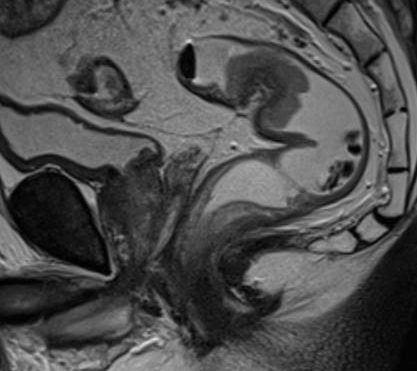A correct preoperative stadialization of rectal carcinoma has a direct influence upon its therapeutic strategy, resulting in a significant improvement of the survival rate and life quality after the treatment. The therapeutic strategy refers to the option of undergoing or not preoperative radiochemotherapy before the total mesorectal excision (TME). The technical advances in the magnetic resonance domain makes possible the multiparametric examinations (mp MRI) with medical equipments (3T models are common) good enough to obtain images having an excellent quality, which allow a correct diagnosis of the local tumour spread. These multiparametric examinations include T2 multiplan sequences and T1 sequences, which offer valuable morphological information due to the high resolution of anatomic structures and DWI functional sequences, with a decisive role in tracing residual tumours after post-surgery radiochemotherapy. The functional examination using DWI is the only highly accurate non-invasive diagnostic method which can differentiate the fibrosis from vital tumoral remnants. The dynamic contrast-enhanced examination (DCE) combined with DWI and volumetry can give supplementary information as to the complete and incomplete response to RCT, and is efficient in detecting a local recurrence after TME. Also, MRI is the only diagnostic method which has the necessary accuracy to assess the meso-rectal fascia, which represents the circumferential resection margin (CRM) in the case of TME. With the help of MRI we can measure with a precision similar to histology the minimal distance to the mesorectal fascia, essential in planning the surgical treatment, and more important than the T stadialization. This allows the selection of patients with an unfavourable prognosis factor who would benefit from radiotherapy or from RCT. The evaluation of other prognostic factors as the condition of nodes, their number and primary site, and the extramural venous invasion (EMVI) have an important role in the individualized therapy.
The Importance of Preoperative Staging of Rectal Cancer Using Multiparametric MRI. A Systematic Review - Part I
By adminin Publikationen